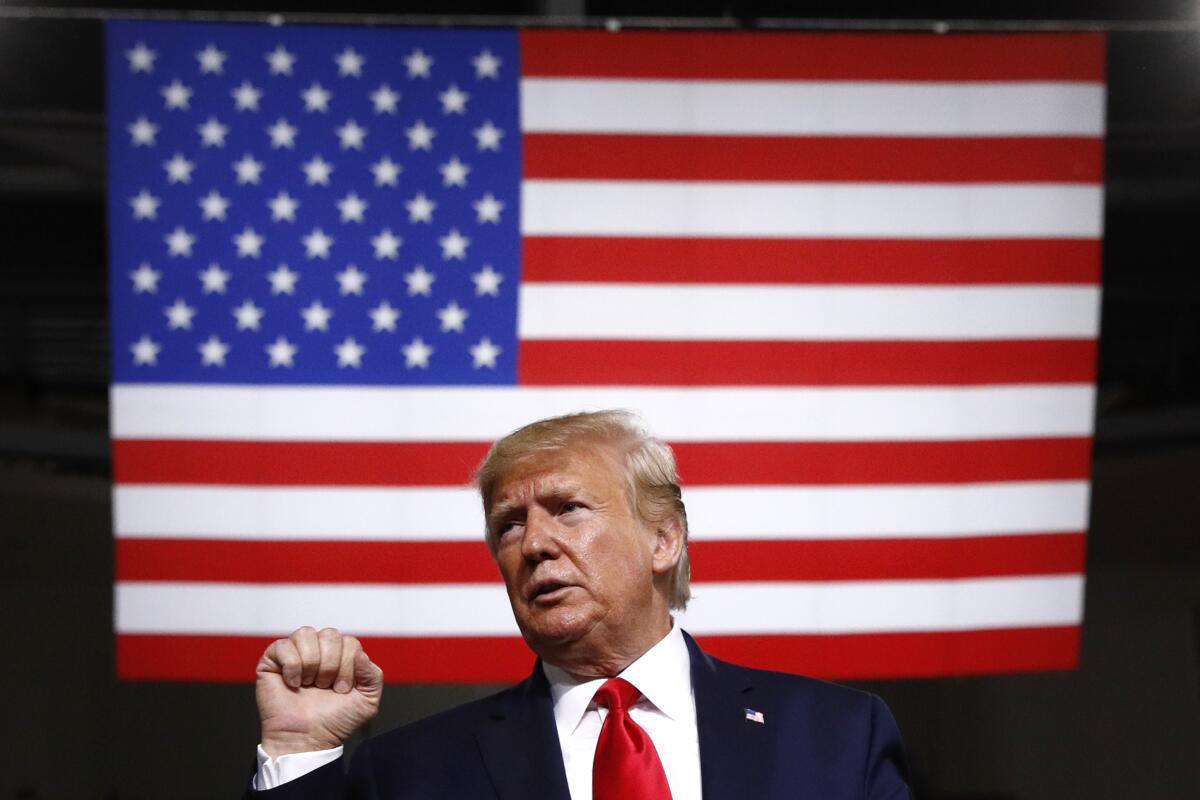Column: On his way out the door, Trump takes aim again at ‘radical’ American history

- Share via
Talk about futile gestures.
With his days in office rapidly dwindling, Donald Trump hurried late last month to appoint the members of his new “1776 Commission,” which he established in November by executive order. Their mission: to do battle with the radicals and socialists he says have taken over our schools.
Never mind that the commission will have almost no time to meet before Trump leaves office, or that incoming President Joe Biden could easily dismantle it. Trump is moving ahead because, as he said in his executive order, students are being “taught in school to hate their own country, and to believe that the men and women who built it were not heroes, but rather villains.”
As Trump said in September: “We must clear away the twisted web of lies in our schools and classrooms, and teach our children the magnificent truth about our country.”
Accentuate the positive! Eliminate the negative!
Now don’t get me wrong. There’s nothing inherently wrong with a commission to discuss how we teach and present the past. Nations ought to rethink and reinterpret their history on a regular basis. Americans should discuss where we came from, how we got here and what we did right and wrong along the way — as well as how we should explain ourselves to our children.
Conservative historians should be a part of that discussion. And liberals and leftists — and traditionalists and revisionists of all sorts.
But when Trump calls for an end to historical hand-wringing and says we should talk ourselves up more with “patriotic education,” that’s not a serious proposal for how we should teach history. It’s propaganda. It’s marketing. It’s salesmanship.
Unsurprisingly, the 18 commission members Trump appointed do not represent a broad mix of scholars but are drawn from the ranks of Christian conservatives, right-wing historians and Republican loyalists who presumably share his rosy view of U.S. history. They include Chairman Larry Arnn, the conservative president of a Christian college in Michigan, a professor of politics and history who made news in 2013 when he noted that his college had been accused of violating state standards for diversity “because we didn’t have enough dark ones.”
The woman Trump appointed as co-chair, a retired professor who is African American, has called the Black Lives Matter movement a “very destructive” Marxist organization.
Many of the commission members are stalwart Trump allies, such as Charlie Kirk, who founded Turning Point USA. The ultra-conservative group is known for keeping a “watchlist” of professors who “advance leftist propaganda.”
From California, Trump appointed dependable conservatives professor Charles Kesler of Claremont McKenna College, who called Joe Biden oleaginous and demagogic in 2012, and pundit-historian-classicist Victor Davis Hanson, who, unsurprisingly, is the author of a recent book (among his many) called “The Case for Trump.”
Trump hopes the commission will combat representations of the U.S. — such as the New York Times’ 1619 Project and Howard Zinn’s “A People’s History of the United States” — that he believes present the country as “evil” and “wicked” and undermine the “virtue of America’s heroes” and the “nobility of the American character.” He apparently believes that too much self-criticism in our schools leads to “rioting and mayhem” in the streets and to “crippling self-doubt” as a nation.
But in their place, what? Just feel-good stories? No more of that tiresome harping on Native American genocide and African American slavery, Tuskegee experiments and Japanese internment?
The truth about history is that it’s complicated. The best intentions go awry. Bad things are done in the name of good causes or are allowed because bad causes are deemed acceptable. Yesterday’s heroes are reevaluated in light of changing values and new revelations. Historians clash over what conclusions to draw.
If George Washington is remembered in the future for the slaves he owned as well as the revolution he led, that’s not a bad thing. Moral complexity is the way of the world.
Indoctrinating students with orthodoxies of any sort in our schools is wrong; the goal should be to produce students who are critical thinkers, open to competing ideas, used to considering opposing points of view and reaching rational, considered conclusions.
Students should learn that the United States stands for freedom of expression, freedom of religion, the expansion of democratic rights and the rule of law. But they should also be taught that Jim Crow existed until the 1960s; women couldn’t vote for the first 140 years of the nation’s existence; and gay people couldn’t marry in all 50 states until five years ago.
If students are exposed to debates among serious historians, perhaps they’ll come to see the country as great and flawed, and its leaders as three-dimensional figures, rather than flat characters representing either good or evil.
One of the commission’s mandates is to offer advice on the nation’s 250th anniversary celebration, coming up in just six years.
And on this, I agree with Trump: On our present trajectory, we’re likely to show up at our own anniversary party on the verge of a divorce, more divided about who we are, were and hope to be than we have been in a long time.
But I also remember the American bicentennial on July 4, 1976, with fireworks exploding and tall ships streaming north up the Hudson River from New York Harbor as I watched from a window. Then, too, we were coming out of a difficult period. We’d just ended a terribly controversial war in Southeast Asia and lived through the Watergate scandal and watched a president resign in disgrace.
The United States is a resilient country. With work, we can heal our fissures. But embracing simple-minded American chauvinism in our classrooms is not the way to do it.
More to Read
A cure for the common opinion
Get thought-provoking perspectives with our weekly newsletter.
You may occasionally receive promotional content from the Los Angeles Times.











